Poodle Adoption Guide
Welcoming a Poodle into your family can be an exciting and rewarding experience. Poodles are intelligent, playful, and affectionate companions that have captivated the hearts of many pet owners around the world. As you embark on this journey, it is essential to become well-informed about the breed to ensure you are well-prepared to provide the best possible home for your new furry friend. This comprehensive guide will explore all aspects of Poodle adoption, from understanding the breed’s history and characteristics to delving into the various sizes, grooming needs, and health concerns.
Poodle Breed Overview
Poodles are an elegant and intelligent dog breed with a rich history that dates back to the 15th century. Originally bred in Germany as water retrievers, poodles have since become popular in many countries, including France, where they are considered the national dog. Poodles are known for their distinct curly coat, which comes in three sizes: standard, miniature, and toy. With their hypoallergenic coat, they are an excellent choice for individuals and families with allergies. When considering adopting a poodle, it’s essential to understand the breed’s history, physical characteristics, personality traits, and common health issues to provide them the best home possible.
Physically, poodles are well-proportioned and muscular, with an elegant and prancing gait. Their coat is curly and dense, with a wide range of colors, including black, white, apricot, and gray. The coat requires regular grooming and care to prevent matting and maintain a clean and healthy appearance. Poodles are also unique in that they have hair, not fur, which continuously grows, leading to minimal shedding. Poodles have dark, oval-shaped eyes, and their ears hang close to their heads. The breed is known for their energetic and agile nature, often excelling in dog sports and activities such as agility, obedience, and rally.
When it comes to personality traits, poodles are highly intelligent, making them quick learners and easy to train. They are sensitive and attentive to their owners, making them incredibly loyal and affectionate pets. Poodles are adaptable and tend to get along well with children and other pets, especially if socialized from an early age. As a highly social breed, they thrive on spending time with their families and may develop issues such as separation anxiety if left alone for extended periods.
Poodles, like all dog breeds, have certain common health issues to be aware of before adoption. Hip dysplasia, a hereditary condition in which the hip joint doesn’t fit together correctly, is prevalent in the breed, causing pain and mobility issues. Another common health concern is progressive retinal atrophy (PRA), an eye disorder that can eventually lead to blindness. Regular veterinary check-ups and screening tests are essential to detect and manage these conditions early on. Additionally, poodles are prone to certain skin conditions and allergies, so a healthy diet and proper grooming are crucial.
In conclusion, understanding the history, physical characteristics, personality traits, and common health issues of the poodle breed is critical for potential adopters. With their elegant appearance, intelligence, and adaptability, poodles make fantastic pets for a wide range of households. By providing proper care, regular grooming, and adequate mental and physical stimulation, poodle adopters can ensure a happy, healthy, and fulfilling life with their new pet.
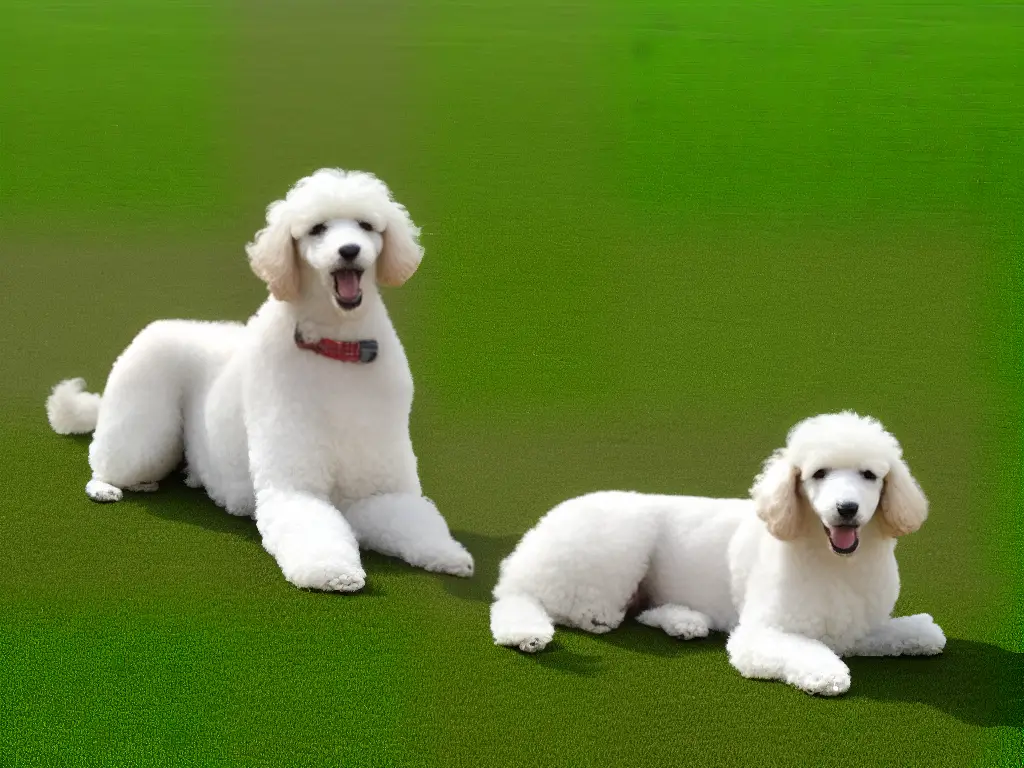
Standard, Miniature, and Toy Poodles
Furthermore, to make an informed decision on poodle adoption, it is essential to know that there are three main types of poodles based on size: Standard, Miniature, and Toy. These sizes not only differ in terms of physical characteristics but also temperament, which is crucial when thinking about which size is the best fit for your lifestyle and living situation. Comparing the height, weight, and temperament of each size will provide a better understanding of what to expect when adopting a poodle, thus ensuring a smooth and happy experience for both you and your new pet.
Standard Poodles
Standard Poodles are the largest of the poodle sizes and typically stand at 18-24 inches tall at the shoulder, with males generally being larger than females. They generally weigh between 45 and 70 pounds. Standard Poodles have a reputation for being intelligent, energetic and graceful. These dogs enjoy a good amount of exercise and require mental stimulation to keep them happy and engaged. Due to their size, Standard Poodles tend to adapt better to spacious living situations and may be well-suited for active individuals or families.
Miniature Poodles
Miniature Poodles, on the other hand, are smaller than their Standard counterparts, standing between 10 and 15 inches tall at the shoulder and weighing between 12 and 20 pounds. While they share many traits with the Standard Poodle, such as intelligence and athleticism, their smaller size makes them more adaptable to different living spaces, such as apartments. Miniature Poodles are lively and affectionate, known to be excellent companions for singles or families with older children.
Toy Poodles
The smallest poodle variety is the Toy Poodle, standing at just 10 inches or less at the shoulder and weighing between 4 and 8 pounds. Despite their diminutive size, they still have the characteristic intelligence and love for activity that Poodles are known for, yet their size makes them even more adaptable to small living spaces. Toy Poodles tend to have a more sensitive temperament compared to larger Poodles and may require gentle handling and socialization from an early age.
All three Poodle sizes, whether they are Toy, Miniature, or Standard, require a similar level of attention when it comes to grooming and health care. They have curly, dense coats that need routine grooming to prevent matting and to maintain their good looks. Poodles are generally healthy breeds, but each size may have its own specific health concerns to be aware of, such as hip dysplasia in Standard Poodles or dental problems in Toy Poodles. Ensuring that you are prepared to dedicate time, attention, and love to your Poodle, regardless of its size, will make both you and your new pet happier in the long run.
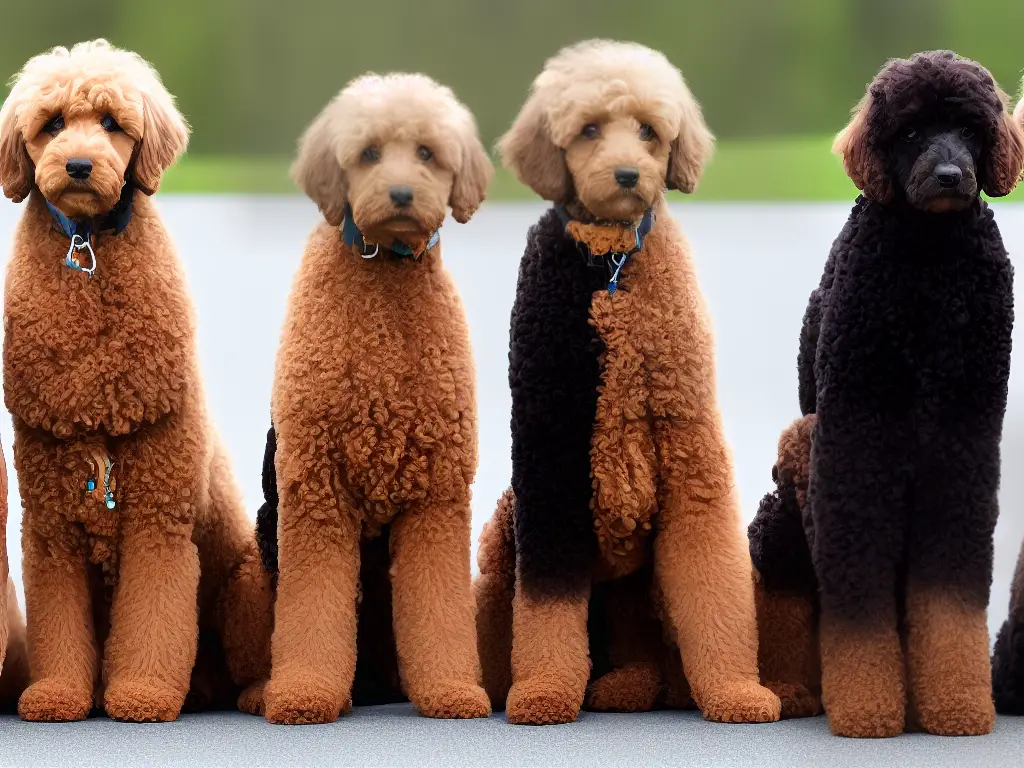
Poodle Grooming and Care
One common trait among all Poodles is their unique, curly coat, which requires regular maintenance to keep it in top condition. Their dense coat doesn’t shed much but can quickly become matted and tangled without proper care. If you’re considering poodle adoption, it’s essential to understand these grooming requirements and be prepared to invest time and effort in maintaining their coat. By staying informed about the specific needs of your Poodle’s size and meeting their grooming and health care necessities, you will enjoy a happy and well-cared-for companion.
One of the most important aspects of Poodle grooming is regular clipping and trimming. There are various Poodle clips, including the “puppy clip,” “sporting clip,” and the “continental clip,” which each have their own unique appearance. It’s recommended that Poodles be professionally groomed every 6-8 weeks to keep their coat in good shape, prevent matting, and reduce the risk of skin infections. Between grooming appointments, brushing the coat daily using a slicker brush and a comb will help remove tangles and keep it neat.
Another crucial aspect of Poodle grooming is bathing. This breed is prone to skin problems, so it’s essential to keep their coat clean and moisturized. Puppies should be introduced to bathing from an early age to help them become accustomed to the process. Poodles should be bathed every 4-6 weeks, depending on their lifestyle and activity level. Always use a high-quality, mild dog shampoo specifically formulated for their coat type, and never use human shampoos, as they can cause skin problems. After bathing, pat the coat dry with a clean towel and use a hairdryer on a cool setting to finish drying before brushing.
Ear cleaning is another essential aspect of Poodle care, as they have long, pendulous ears that can easily trap dirt and moisture, leading to ear infections. Regular ear checks and cleaning should be a part of the grooming routine. First, check the ears for any foul smell, discharge, or redness, which could indicate an infection. Use a vet-approved ear cleaning solution and a soft cloth or cotton ball to wipe down the inside of the ears. Never insert anything into the ear canal, as this could cause injury. If any issues or concerns arise regarding the dog’s ears, it’s important to contact a veterinarian for a consultation.
Poodle grooming encompasses both maintaining good overall hygiene and health as well as coat maintenance. Routine tasks such as trimming nails, regular dental care, and checking for any unusual lumps, bumps, or skin irritations should be part of a Poodle’s grooming regimen. These steps will help ensure that your Poodle remains healthy and looking its best. Understanding and meeting the specific grooming and care requirements of Poodles will prepare you for the commitment and responsibilities that come with adopting this wonderful breed.
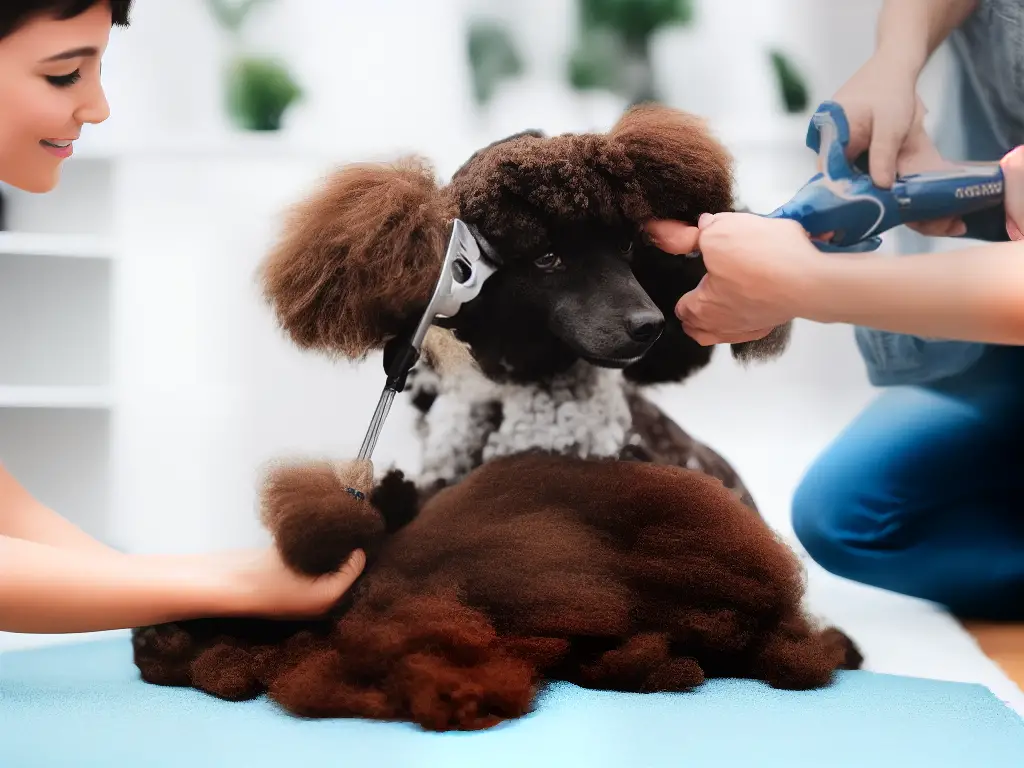
Poodle Training
In addition to grooming, it is essential to consider the specific training needs when adopting a Poodle. Poodles are highly intelligent and quick learners, which is one of their most endearing qualities. Basic obedience training should be started as early as possible, ideally when the Poodle is still a puppy, and should focus on teaching them essential commands such as sit, stay, come, and down. Engaging your Poodle in consistent, positive training will not only promote good behavior but also strengthen the bond between you and your new pet, ensuring a smooth adoption process and a fulfilling life together.
Another important aspect of training is socialization, which involves exposing your Poodle to various environments, people, and other animals to help them adapt to different situations. Poodles are friendly and adaptable, making them great family pets. Introduce them to different people, animals, and environments right from the start to ensure they grow up to be well-adjusted and sociable adults. Frequent trips to the local dog park, playdates with other dogs, and enrolling in puppy socialization classes are all great ways to help your Poodle develop essential social skills.
Housebreaking, or potty-training, is another crucial aspect of your Poodle’s training journey. Consistency, patience, and positive reinforcement are key when teaching your Poodle where and when to relieve themselves. Designate a specific area in your yard for your dog to eliminate, take them out on a schedule – usually after meals and before bedtime, and praise them when they succeed. It may take some time for your Poodle to become fully housebroken, but with persistence, they will eventually learn the appropriate behaviors.
To ensure that your Poodle’s training process is as enjoyable and effective as possible, it is essential to use positive reinforcement methods. Rewarding your dog’s good behavior with praise, treats, and affection while ignoring or redirecting negative behaviors is more engaging and successful in shaping good behavior. A positive, enthusiastic, and patient attitude throughout the training process will help your Poodle understand what is expected of them and ultimately lead to an obedient and well-behaved companion.
Poodles are known for their intelligence, elegance, and lively personalities, making them a popular breed for adoption. It is important for prospective poodle adopters to be aware of the exercise and activity requirements of this breed to ensure their health and happiness.
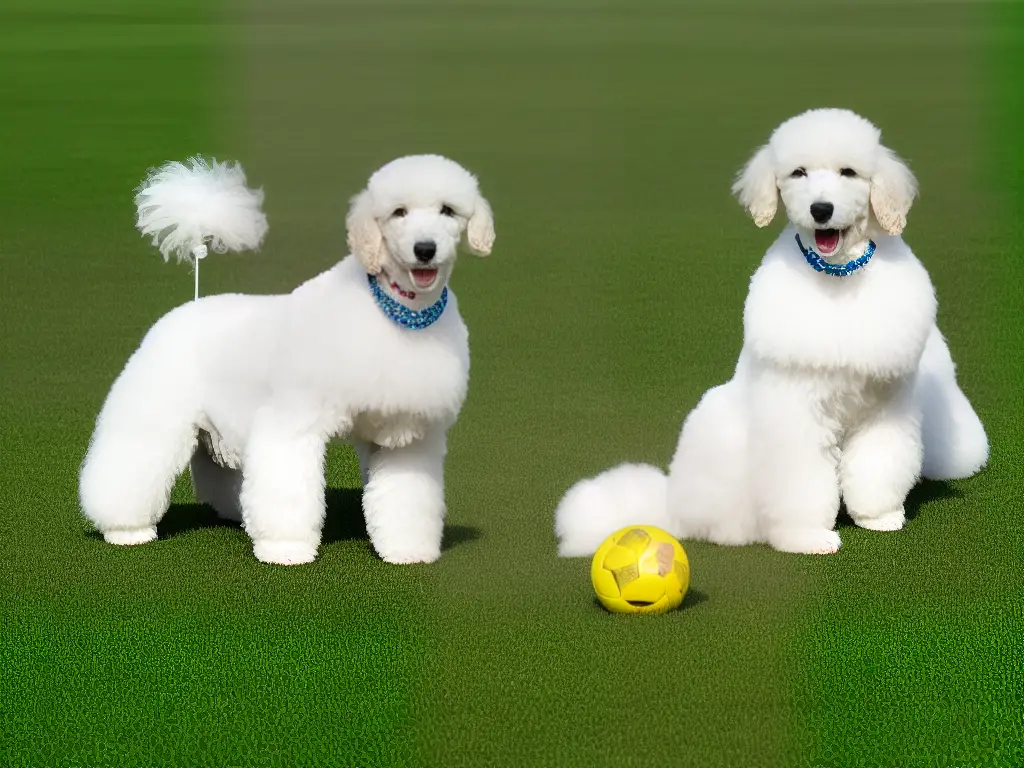
Exercise and Activity Requirements
Furthermore, Poodles require daily physical and mental stimulation to thrive. Engage them in various canine sports, such as agility, obedience, and scent work, to reinforce their training and strengthen your bond with them. Providing them with various toys and puzzles can also aid in stimulating their intellect and alleviating boredom. By addressing these aspects of training appropriately, adopting a Poodle can be a rewarding experience, providing a loving and well-behaved companion for years to come.
All three sizes of poodles – Standard, Miniature, and Toy – have varying activity levels but overall, they require regular physical exercise and mental stimulation to thrive.
Standard Poodles
The largest of the three varieties generally have higher energy levels and exercise requirements than their smaller counterparts. They benefit from daily walks, off-leash romps in secure areas, swimming, and play sessions with other dogs. Agility training or dog sports like flyball can also be a great way to keep a Standard Poodle engaged and physically active.
Miniature and Toy Poodles
Although less energetic than Standard Poodles, still require daily walks and play sessions with their human family or other canine companions. Puzzle toys can provide these smaller poodles with mental stimulation that supports their overall well-being.
In addition to physical exercise, poodles flourish when given opportunities for mental stimulation. This intelligent breed enjoys learning new tricks and games, engaging in interactive play, and participating in dog sports or obedience training. Providing a poodle with mental challenges not only helps to prevent boredom but also strengthens the bond between the dog and their adoptive family.
It is essential that potential adopters of poodles can commit to fulfilling the breed’s exercise and activity requirements, as lack of sufficient stimulation can lead to destructive behaviors and other behavioral issues. Poodles are highly adaptable and can thrive in a variety of home environments, including apartments and larger properties, as long as their physical and mental exercise needs are consistently met.
In addition to meeting their exercise and activity requirements, poodles also benefit from a structured daily routine that includes consistent feeding times, exercise sessions, and periods of rest. This predictability can help reduce anxiety and encourage positive behaviors, ensuring a more harmonious and rewarding relationship between the poodle and their adoptive family.
When considering poodle adoption, it is important for prospective adopters to understand and commit to the unique activity needs of this intelligent and engaging breed. By creating an environment that supports the health, happiness, and well-being of your poodle, you will ensure a successful, long-lasting bond with your new canine companion.
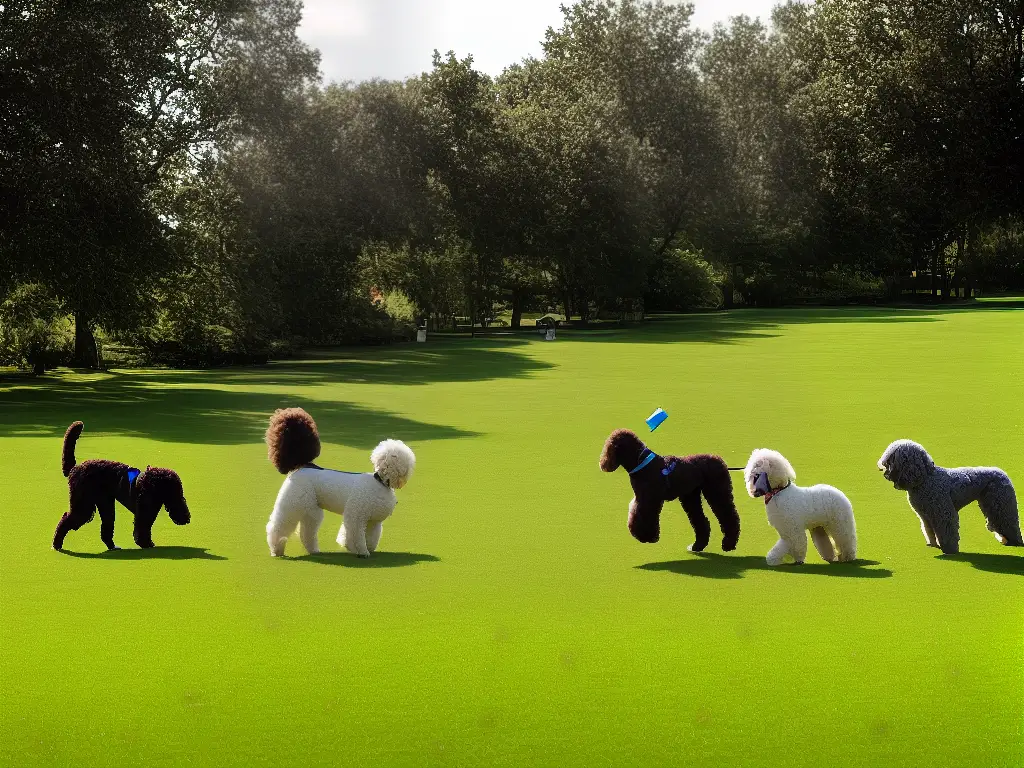
Nutrition and Feeding
One key aspect of providing a supportive environment for your poodle is attending to their nutritional needs. Familiarize yourself with the optimal food options and feeding schedules that will best serve their long-term health. Poodles may have specific dietary requirements due to factors such as breed, size, and age; therefore, conducting thorough research and consulting with a veterinarian is essential to meet their unique nutritional needs and ensure a happy, healthy life together.
Commercial dog foods are available in various qualities, typically ranging from grocery store brands to premium quality options. Premium foods are usually the better choice, as they often contain higher-quality ingredients, including real meats, whole grains, and essential nutrients. When choosing food for your poodle, look for reputable brands that use high-quality, natural ingredients and have appropriate nutrient levels for their age, size, and activity level. Your veterinarian can help you select the best food based on your poodle’s individual needs.
Poodles, like all dogs, can suffer from food allergies or intolerances, so it is crucial to monitor their reaction to new foods. Common allergens include beef, chicken, dairy, corn, soy, and wheat. If your poodle shows symptoms of allergies, such as itching, redness, or gastrointestinal issues, it is essential to consult with a veterinarian to identify the allergen and adjust their diet accordingly. Your vet may recommend a limited ingredient or hypoallergenic dog food, which can help alleviate allergy symptoms.
Feeding schedules are another essential aspect of proper poodle nutrition. Poodle puppies should be fed more frequently than adults, usually three to four times a day, while adult poodles can be fed twice daily. Establishing a consistent feeding schedule ensures your poodle consumes an adequate amount of food and keeps their metabolism stable. Remember to measure portion sizes according to your poodle’s size, breed, and activity level, as overfeeding can lead to obesity, which can cause various health issues.
Giving your poodle a balanced diet, consistent feeding schedule, and monitoring potential allergens can ensure their best possible health and well-being throughout their life. Treats can be an excellent tool for training and bonding with your poodle, but it is essential not to overindulge them. Treats should make up no more than 10% of a dog’s daily diet, and it is important to choose healthy options that are low in fat and calories. Avoid feeding table scraps, as they can contribute to poor nutrition and obesity.

Poodle Health Issues and Lifespan
In addition to proper nutrition, being aware of potential health concerns is vital when adopting a poodle. Poodles have a relatively long lifespan compared to other breeds, typically living between 12-15 years. However, like any dog breed, they can be susceptible to specific health issues, some of which are genetic. By understanding these health concerns before adopting a Poodle, you can better prepare for their care and well-being throughout their life.
Hip Dysplasia
Hip dysplasia is one of the most common health issues faced by Poodles. This genetic condition occurs when the hip joint does not develop correctly, leading to arthritis and pain. While large Poodle varieties tend to be more at risk for hip dysplasia, it can occur in smaller Poodles too. Responsible breeders will typically screen their dogs for hip dysplasia, but when adopting, it is wise to check if the dog has a history of hip-related issues.
Progressive Retinal Atrophy (PRA)
PRA is another health concern in Poodles. This degenerative eye condition leads to the gradual deterioration of retinal tissue, eventually resulting in blindness. PRA is an inherited disorder, meaning that responsible breeders should screen their dogs for any signs of the disease. If you are considering adopting a Poodle, it is crucial to gather as much information as possible regarding their eye health history.
Skin Conditions
Poodles are also predisposed to certain skin conditions, such as sebaceous adenitis. This autoimmune disorder results in inflammation of the skin glands, leading to hair loss and skin issues. Regular grooming and skincare can help manage these problems, but severe cases may require more intensive treatment plans. When adopting a Poodle, pay attention to their skin health and seek veterinary advice if you suspect any issues.
Heartworm Disease
Before considering poodle adoption, it is essential to become informed about possible health concerns, such as heartworm disease. Poodles can be at risk for this disease, caused by mosquito-borne parasites that may lead to serious health issues. It is crucial to be vigilant about heartworm prevention measures for your Poodle, such as monthly preventatives, to minimize the likelihood of infection. Discussing heartworm prevention with your veterinarian can ensure you are prepared to keep your Poodle safe from this harmful disease once you adopt.
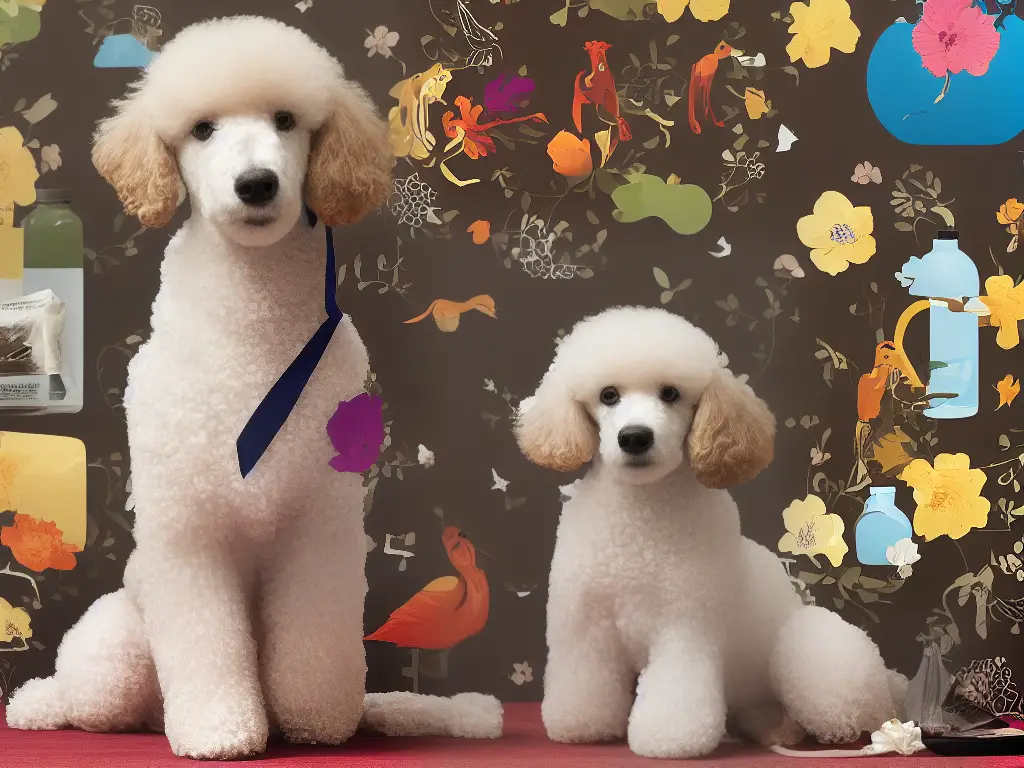
Where to Adopt a Poodle
As you begin your search for a Poodle to adopt, local animal shelters or rescue organizations provide a great starting point. These organizations are dedicated to providing care and finding new homes for dogs, including Poodles, that have been lost, abandoned, or surrendered by their previous families. By adopting a Poodle from a shelter, you are giving a loving home to an animal that desperately needs one. Some reputable shelters to browse for Poodle adoption include the ASPCA, the Humane Society, and your local municipal animal shelters. You can also try popular pet adoption websites, such as Petfinder and Adopt-a-Pet, which have searchable databases of dogs available for adoption from shelters and rescue organizations, ensuring you are prepared to find your furry companion while also keeping them safe from potential health concerns such as heartworm disease.
If you have a specific Poodle variety in mind, you may want to consider breed-specific rescue organizations. These groups are devoted to rescuing Poodles and Poodle mixes and finding them new homes. They may specialize in one particular Poodle variety, such as Toy, Miniature, or Standard, and can provide specialized care, information, and support for adopting parents. In the United States, Poodle Rescue organizations include Poodle Club of America Rescue Foundation, Mid-Atlantic Poodle Rescue, and Carolina Poodle Rescue. They often list available Poodles on their websites or social media platforms.
In some cases, reputable Poodle breeders may also have older dogs available for adoption. They may be retired show dogs, breeding dogs, or simply dogs that have been returned to the breeder for various reasons. Ensure you do thorough research when looking for a breeder: a responsible breeder should be registered with a reputable breed organization, such as the Poodle Club of America or the American Kennel Club. They should prioritize the health, temperament, and well-being of their dogs and be able to provide information on their breeding practices and health clearances.
In-person and online support groups for Poodle enthusiasts can also provide valuable resources in your search for a Poodle to adopt. These communities often share personal experiences, advice, and recommendations on finding and adopting a Poodle. This can include referrals to reputable breeders, shelters, and rescue organizations, as well as notices about Poodles in need of a new home. Facebook groups, online forums, and local meet-up groups for Poodle owners can be a great way to connect with fellow Poodle lovers, ask questions, and get first-hand information on available Poodles in your area.
Attending local dog shows, agility competitions, or Poodle-specific events is a wonderful way to become informed about Poodle adoption and start your journey to finding the perfect furry companion. These events offer an opportunity to meet breeders and rescue representatives in person, learn more about the breed and its specific needs, and establish connections with local experts and enthusiasts. Building a rapport with breeders and rescuers will increase your chances of finding the perfect Poodle for your family, as they are more likely to trust you as a responsible owner, keep you informed about available dogs, and help match you with the right Poodle for your lifestyle and preferences.
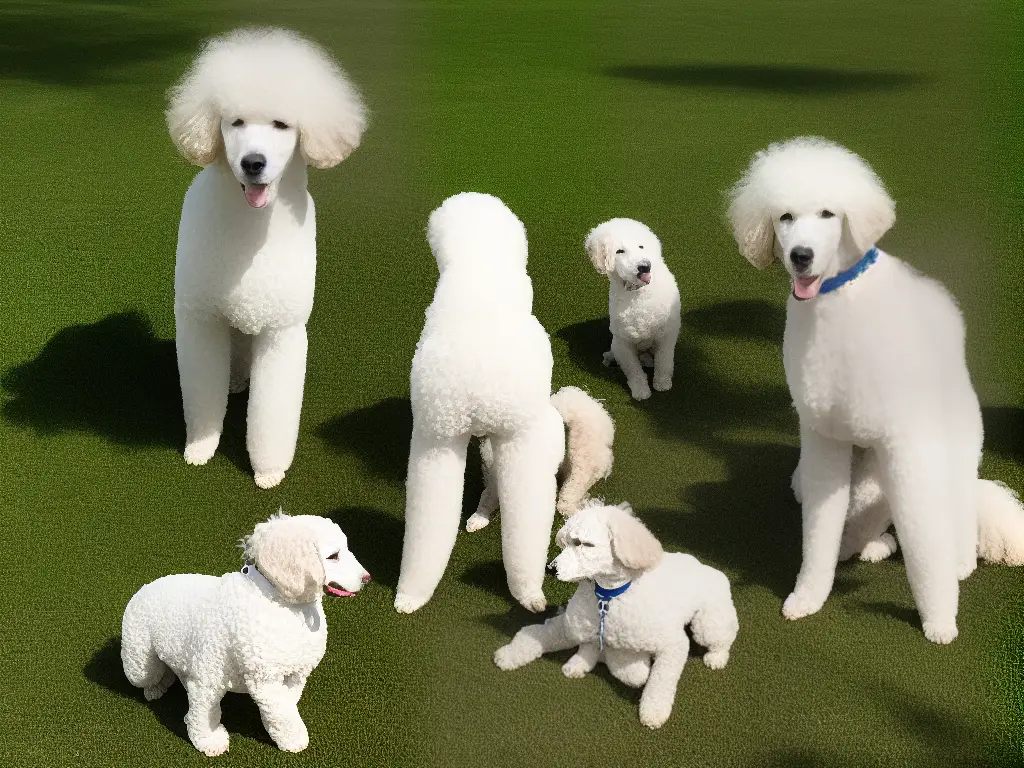
Poodle Adoption Process and Costs
As you immerse yourself in the Poodle community and gain knowledge about the breed, it is essential to understand the adoption process and related costs. To start the adoption journey, submit an adoption application with a reputable adoption agency or rescue organization. This typically involves providing information about your family, lifestyle, living situation, and experience with pets, specifically poodles or other dog breeds. The agency then reviews the application to determine whether you’re a suitable match for a poodle in their care. Keep in mind that there might be a wait time as rescue organizations assess which dog may best suit your lifestyle and expectations, so patience is key in finding the ideal Poodle for you.
After the application has been approved, the agency will discuss suitable poodles available for adoption and arrange a meet-and-greet. These meetings provide an opportunity to interact with the dog and assess the compatibility of the dog with the adoptive family. Organizations may also perform a home visit to ensure that the living conditions are safe, secure, and appropriate for a poodle. A home visit allows the agency to confirm the information provided in the application and offer advice on preparing the space for a new pet.
The cost of poodle adoption will vary depending on the agency and the dog’s circumstances. Adoption fees often range from $300 to $800, which helps cover expenses such as vaccinations, spaying/neutering, microchipping, and any necessary medical care. Keep in mind that the total cost of adoption will be higher than just the fees, as you will need to invest in food, bedding, toys, grooming supplies, and potential medical expenses for your new furry companion. Having pet insurance and a dedicated budget for pet care can help manage these ongoing costs.
The support from adoption agencies and rescue organizations doesn’t end once the poodle is in a new home. Many groups offer ongoing assistance such as training resources, medical advice, and a network of fellow adopters to help ease the transition. Additionally, they may be available for consultation on any difficulties that arise, including behavioral issues or concerns about the dog’s health. By maintaining an open line of communication with the adopting agency, you can ensure the best possible outcome for both you and your new pet.
Adopting a poodle is a lasting commitment that has significant implications for both the adopted dog and the adoptive family. Being fully informed and prepared for the responsibility of caring for a rescue poodle is crucial in fostering a positive relationship and ensuring an enriching experience for everyone involved. By understanding the adoption process and committing to ongoing care, you can provide a loving and nurturing home for a poodle in need, resulting in a highly rewarding experience for all.

Preparing Your Home for a Poodle
Before welcoming a rescue poodle into your family, it’s important to prepare your home by creating a designated space for your new dog. This can be a specific room, a crate, or even just a corner of a room with a bed or blanket. Poodles are intelligent and social dogs that appreciate having a comfortable and secure space to call their own. In addition, it’s necessary to establish boundaries and restrict access to certain areas of your home, such as the kitchen or bedrooms. Using baby gates can help accomplish this, allowing you to limit your poodle’s access while still maintaining a clear line of sight, ensuring a seamless integration of your new pet into the household.
In addition to creating a comfortable space, it’s essential to puppy-proof your home for your new Poodle. This includes removing any potential hazards such as poisonous plants, exposed wires, and small objects that could be swallowed. Poodles are known for their curiosity, so take the time to secure any cabinets or closets that contain potentially dangerous items, such as cleaning supplies or medications. You should also consider putting away any prized possessions that might be tempting for a curious dog to chew on or play with.
Once you have the physical space in your home prepared, it’s time to stock up on everything your new Poodle will need. A few of the essential items you’ll need to purchase include a collar, leash, food and water dishes, grooming supplies, chew toys, and dog food appropriate for your Poodle’s age and size. Crate training is an effective method for house training and providing a safe space for your dog, so you may want to invest in a crate as well. Keep in mind that Poodles need regular grooming, so a brush, comb, and dog shampoo are essential for maintaining your Poodle’s coat and skin health.
Another important aspect of welcoming a new poodle into your home is ensuring that the entire household is prepared for the arrival. This includes discussing the responsibilities that each family member will have and setting expectations for the dog’s care and training. Poodles are highly trainable dogs, so it’s crucial to begin positive reinforcement training methods right away. This will help establish a strong bond between your Poodle and each family member while teaching your dog the appropriate behaviors for living in your home.
Lastly, consider planning for regular exercise and socialization opportunities for your new Poodle. Poodles are an active breed that requires mental and physical stimulation to stay healthy and happy. Develop a routine for walks, playtime, and interaction with other dogs. This can help reduce the likelihood of behavioral issues and promote a happier, well-adjusted life for your new family member. In addition to physical activity, Poodles also excel at obedience training and agility competitions, so consider enrolling your dog in classes or other organized activities to help keep their minds sharp and engaged.
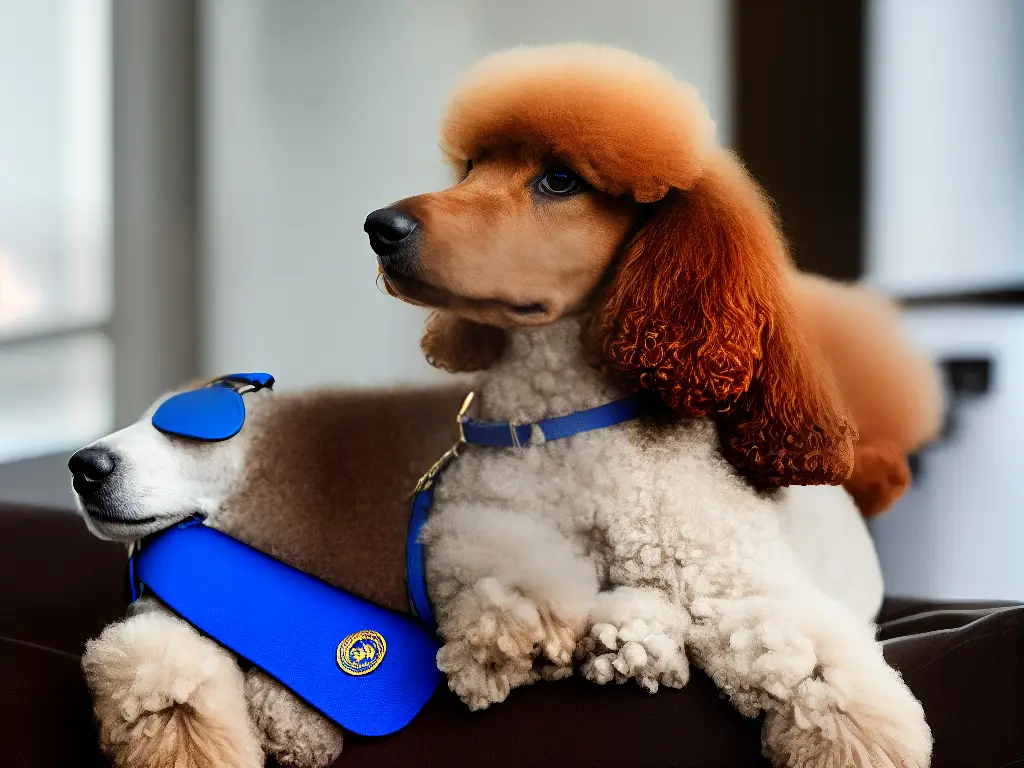
Armed with this wealth of knowledge on Poodle adoption, you are now better equipped to make an informed decision and provide a loving home for your new canine companion. As you progress through the adoption process, remember to always prioritize your Poodle’s well-being and happiness, ensuring they have a comfortable living environment, ample exercise opportunities, and proper nutrition. With the right care and love, you and your Poodle can forge a strong, lasting bond and experience the joy of sharing life together as a happy, thriving family.
